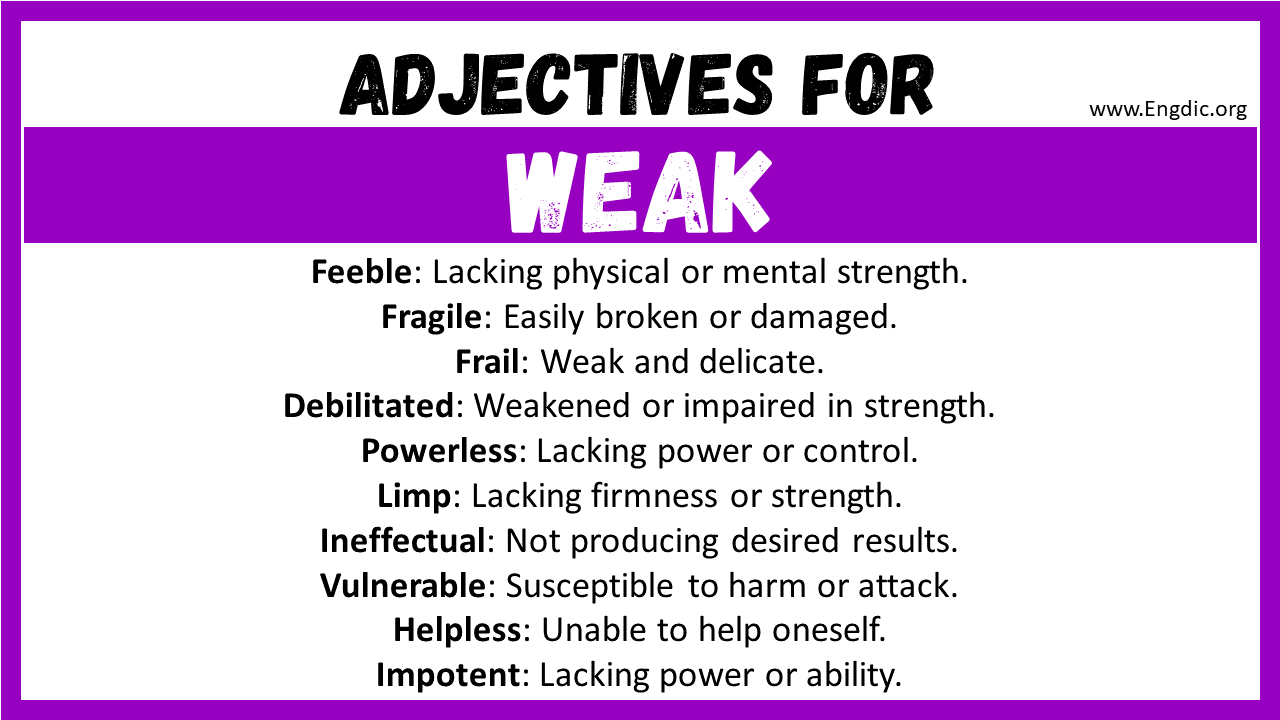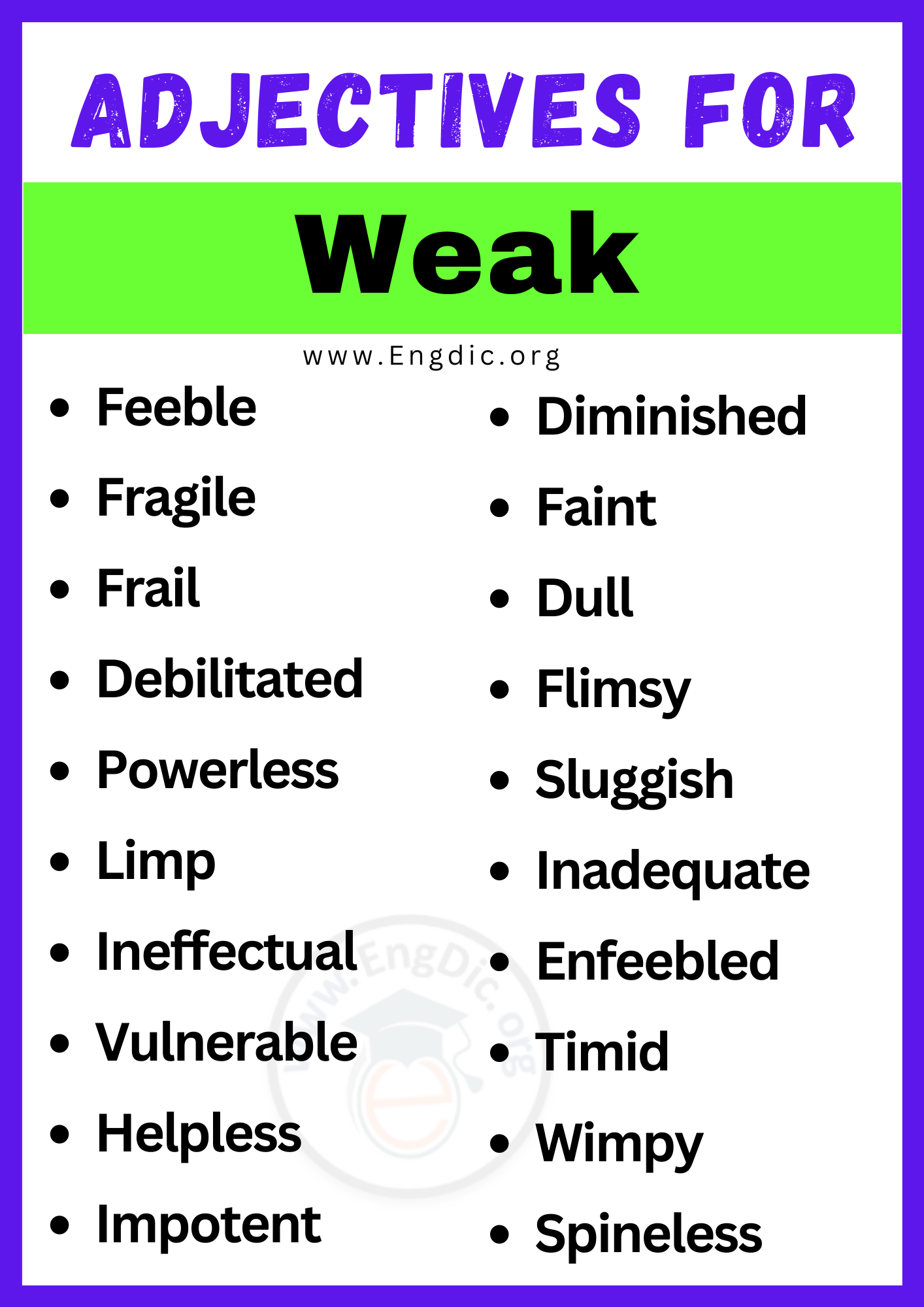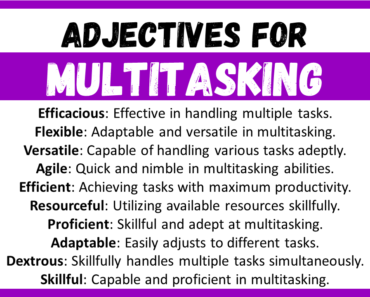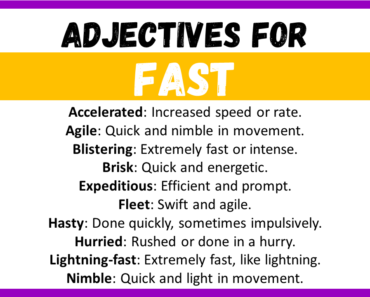Weak is a term that refers to a lack of strength or power. It embodies a state of vulnerability and fragility. When trying to express this concept, we often turn to words that aptly describe weakness. These words capture the essence of physical, emotional, or intellectual feebleness. They evoke a sense of delicacy, susceptibility, or ineffectiveness. From frail and debilitated to timid and powerless, the lexicon for describing weakness encompasses a range of nuanced expressions. In this blog post, we will explore some of these words in detail, illuminating their meanings and providing examples of their usage.
Adjectives for Weak
Here are the 20 Most Popular adjectives for weak:
- Feeble
- Fragile
- Frail
- Debilitated
- Powerless
- Limp
- Ineffectual
- Vulnerable
- Helpless
- Impotent
- Diminished
- Faint
- Dull
- Flimsy
- Sluggish
- Inadequate
- Enfeebled
- Timid
- Wimpy
- Spineless
Adjectives for Weak Students:
- Underachieving
- Struggling
- Incompetent
- Lacking
- Unprepared
- Clueless
- Disengaged
- Inefficient
- Inept
- Unmotivated
Adjectives for Weak-Minded:
- Gullible
- Easily swayed
- Indecisive
- Vulnerable
- Fragile
- Susceptible
- Credulous
- Impressionable
- Timid
- Naive
Adjectives for Weak Health:
- Frail
- Feeble
- Ailing
- Debilitated
- Delicate
- Vulnerable
- Impaired
- Sensitive
- Unsound
- Lethargic
Adjectives for Weak Point:
- Vulnerable
- Fragile
- Susceptible
- Deficient
- Problematic
- Flawed
- Faulty
- Limiting
- Inadequate
- Failing
Words to Describe a Weak with Meanings
- Feeble: Lacking physical or mental strength.
- Fragile: Easily broken or damaged.
- Frail: Weak and delicate.
- Debilitated: Weakened or impaired in strength.
- Powerless: Lacking power or control.
- Limp: Lacking firmness or strength.
- Ineffectual: Not producing desired results.
- Vulnerable: Susceptible to harm or attack.
- Helpless: Unable to help oneself.
- Impotent: Lacking power or ability.
- Diminished: Reduced in strength or quality.
- Faint: Lacking strength or intensity.
- Dull: Lacking brightness or sharpness.
- Flimsy: Weak or easily broken.
- Sluggish: Lacking energy or responsiveness.
- Inadequate: Not sufficient or suitable.
- Enfeebled: Made weak or feeble.
- Timid: Lacking courage or confidence.
- Wimpy: Weak or ineffectual.
- Spineless: Lacking determination or backbone.
Example Sentences for Weak Adjectives
- She struggled to lift the feeble box.
- Be careful with that vase, it’s fragile.
- The frail old man needed assistance walking.
- After the illness, he was left debilitated.
- The dictator rendered the opposition powerless.
- The flower was wilted and limp in the vase.
- Despite his efforts, his argument was ineffectual.
- The vulnerable child needed protection and care.
- The stranded hiker felt helpless without a phone.
- The magician’s trick left the audience feeling impotent.
- The storm’s force diminished as it moved away.
- Her voice was so soft, almost faint.
- The lecture was so boring, it put me in a dull mood.
- The flimsy tent collapsed in the wind.
- He felt sluggish after a long day at work.
- The equipment was inadequate for the task.
- The illness enfeebled her body and spirit.
- The timid puppy hid behind its owner’s legs.
- He was disappointed by the wimpy response to his request.
- His spineless behavior made him an easy target.
Explore More Words:
FAQ’s
How to describe weak in writing?
Weak can be described in writing by using adjectives such as feeble, fragile, or powerless to convey a lack of strength or effectiveness in a concise and vivid manner.
What is another word for weak?
Another word for weak is “frail,” which implies a delicate or fragile state. Other synonyms include feeble, powerless, or fragile, depending on the specific context in which the term is used.








